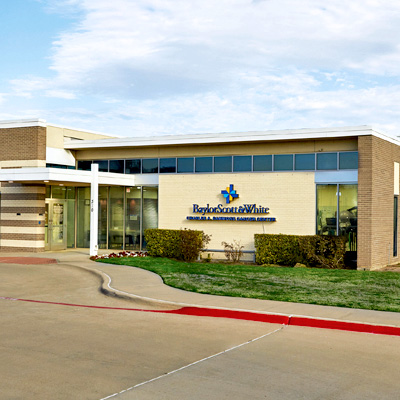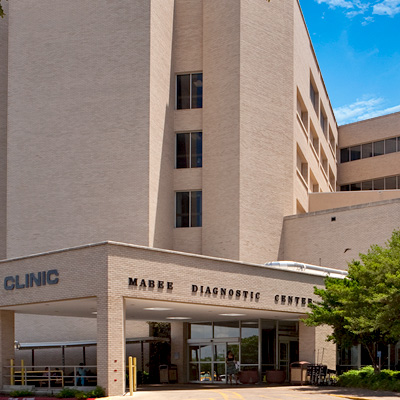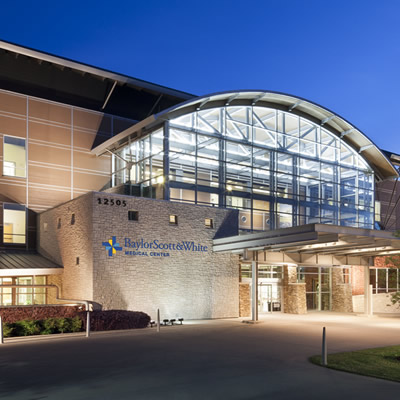Giving caregivers the support they need
Caregivers play vital roles in a cancer patient’s care and support system. If you’ve recently become a caregiver to someone with cancer, you can trust that your Baylor Scott & White team is as concerned about your well-being as much as your loved one’s.
Your loved one’s nurse navigator can serve as a single point of contact for questions you may have and resources you may need. They can help you learn about your loved one’s diagnosis, treatment options, clinical trials and support groups, which will help you throughout the journey.
The nurse navigator also wants to help ensure you, as the caregiver, feel up to the demands of caregiving, which can affect you emotionally and physically. Below are some steps you can take and resources available to you as your loved one receives care.
Mental and emotional health
The psychological and emotional stress of caregiving is perhaps the hardest part of caring for a loved one. It’s perfectly normal to feel anger, sadness or guilt, and juggling the medical needs of someone else can feel very overwhelming.
Talking to a mental health counselor or social worker is a good first step toward caring for your mental well-being. You can also take other steps to feel more in control of the situation and lessen the overwhelm of caregiving.
Share your feelings
Whether caring for a parent, spouse or child, you have a unique relationship with the person who has cancer. Your parent may not want to accept help from a child, and you may feel grief over the possibility of losing a spouse or child.
These feelings are valid, and you need to address them to protect your own mental health. Support groups offer safe spaces to meet other people in your situation, or you may feel more comfortable discussing them with a therapist or through the act of journaling.
Ask for help
Don’t feel like you have to do everything you did before you took on the role of caregiver. You may receive offers of help, and when you do, be specific with your requests, such as cooking meals or doing household chores.
Help can come in other ways, as well. For example, online delivery services may help make grocery shopping or medication pickups easier. Find a website that allows you to hire people for one-off tasks, such as yard maintenance. Use social media to update loved ones if that’s easier than calling people individually.
Finally, learn to let go of small tasks when you don’t have the time or energy to address them. It’s okay to let dishes sit in the sink for one night or if leaves pile up in the yard.
Schedule personal time off
You may feel guilty about doing things you enjoy when your loved one is dealing with cancer. However, those opportunities to recharge will improve your mental and physical well-being.
Make time every day for something you enjoy, even if it’s a 10-minute walk or 30 minutes to watch your favorite TV show. Try to maintain your routines as much as you can, whether going to church on Sunday or attending your monthly book club. A social worker can help you arrange respite care for those times.
Physical well-being
It’s easy for your physical health to become a low priority when you’re caring for someone with a serious illness, but if your body is not well, you won’t have the energy or strength to be there for your loved one.
While it can feel difficult to make time for healthy habits, there are some simple steps you can take to help stay physically healthy:
- Drink plenty of water: Dehydration can make you feel tired, cause headaches and bring on other uncomfortable symptoms. Drink enough that your urine is pale yellow or clear.
- Eat a healthy diet: Healthy foods will give you energy. For simple, nutritious meals, stock up on bagged salad blends, frozen vegetables and grains, low-sodium canned beans and lean poultry.
- Get sufficient sleep: Aim for seven to nine hours of sleep every night.
- Keep your medical appointments: Ask friends or family to sit with your loved one, if needed, so you can attend checkups and screenings.
- Take a daily walk: Regular exercise lowers your stress levels and gives you an energy boost.
Find a location near you
At Baylor Scott & White, you have access to compassionate, expert care for a wide range of cancers. We help you find cancer support services at a location that fits your needs. We offer several locations for your care across North and Central Texas.

Baylor Scott & White - Plano Brain and Spine Center
4708 Alliance Blvd Ste 810, Plano, TX, 75093
Baylor Scott & White All Saints Medical Center - Fort Worth
1400 8th Ave , Fort Worth, TX, 76104
Baylor Scott & White Cancer and Infusion Center - Austin Oak Hill
5251 US 290 Ste 100, Austin, TX, 78735- Monday: 8:00 am - 5:00 pm
- Tuesday: 8:00 am - 5:00 pm
- Wednesday: 8:00 am - 5:00 pm
- Thursday: 8:00 am - 5:00 pm
- Friday: 8:00 am - 5:00 pm

Baylor Scott & White Cancer Center - College Station
800 Scott and White Dr , College Station, TX, 77845- Monday: 8:00 am - 5:00 pm
- Tuesday: 8:00 am - 5:00 pm
- Wednesday: 8:00 am - 5:00 pm
- Thursday: 8:00 am - 5:00 pm
- Friday: 8:00 am - 5:00 pm

Baylor Scott & White Cancer Center - Killeen
2207 S Clear Creek Rd Ledger and Smith Professional Bldg, Ste 101, Killeen, TX, 76549- Monday: 8:00 am - 5:00 pm
- Tuesday: 8:00 am - 5:00 pm
- Wednesday: 8:00 am - 5:00 pm
- Thursday: 8:00 am - 5:00 pm
- Friday: 8:00 am - 5:00 pm

Baylor Scott & White Cancer Center - Round Rock
300A University Blvd , Round Rock, TX, 78665- Monday: 8:00 am - 5:00 pm
- Tuesday: 8:00 am - 5:00 pm
- Wednesday: 8:00 am - 5:00 pm
- Thursday: 8:00 am - 5:00 pm
- Friday: 8:00 am - 5:00 pm

Baylor Scott & White Charles A. Sammons Cancer Center - Dallas
3410 Worth St , Dallas, TX, 75246
Baylor Scott & White Charles A. Sammons Cancer Center - Duncanville
310 E Hwy 67 , Duncanville, TX, 75137- Monday: 8:00 am - 5:00 pm
- Tuesday: 8:00 am - 5:00 pm
- Wednesday: 8:00 am - 5:00 pm
- Thursday: 8:00 am - 5:00 pm
- Friday: 8:00 am - 5:00 pm

Baylor Scott & White Charles A. Sammons Cancer Center - Irving
2001 N MacArthur Blvd Ste 120, Irving, TX, 75061
Baylor Scott & White Charles A. Sammons Cancer Center - Waxahachie
2380 N Interstate 35E , Waxahachie, TX, 75165- Monday: 7:30 am - 4:30 pm
- Tuesday: 7:30 am - 4:30 pm
- Wednesday: 7:30 am - 4:30 pm
- Thursday: 7:30 am - 4:30 pm
- Friday: 7:30 am - 4:30 pm
- Saturday: 7:30 am - 4:30 pm
- Sunday: 7:30 am - 4:30 pm

Baylor Scott & White Clinic - Brenham Day Street
2111 S Day St , Brenham, TX, 77833- Monday: 8:00 am - 5:00 pm
- Tuesday: 8:00 am - 5:00 pm
- Wednesday: 8:00 am - 5:00 pm
- Thursday: 8:00 am - 5:00 pm
- Friday: 8:00 am - 5:00 pm

Baylor Scott & White Clinic - College Station Rock Prairie
800 Scott and White Dr , College Station, TX, 77845- Monday: 7:30 am - 5:00 pm
- Tuesday: 7:30 am - 5:00 pm
- Wednesday: 7:30 am - 5:00 pm
- Thursday: 7:30 am - 5:00 pm
- Friday: 7:30 am - 5:00 pm

Baylor Scott & White Clinic - Round Rock 300 University
300A University Blvd , Round Rock, TX, 78665- Monday: 8:00 am - 5:00 pm
- Tuesday: 8:00 am - 5:00 pm
- Wednesday: 8:00 am - 5:00 pm
- Thursday: 8:00 am - 5:00 pm
- Friday: 8:00 am - 5:00 pm

Baylor Scott & White Clinic - Temple
2401 S 31st St , Temple, TX, 76508- Monday: 8:00 am - 5:00 pm
- Tuesday: 8:00 am - 5:00 pm
- Wednesday: 8:00 am - 5:00 pm
- Thursday: 8:00 am - 5:00 pm
- Friday: 8:00 am - 5:00 pm

Baylor Scott & White Hillcrest Breast Center - Waco
50 Hillcrest Medical Blvd Bldg I, Ste 103-B, Waco, TX, 76712- Monday: 7:00 am - 6:30 pm
- Tuesday: 7:00 am - 6:30 pm
- Wednesday: 7:00 am - 6:30 pm
- Thursday: 7:00 am - 5:00 pm
- Friday: 7:00 am - 3:00 pm

Baylor Scott & White McClinton Cancer Center - Waco
150 Hillcrest Medical Blvd , Waco, TX, 76712- Monday: 8:00 am - 5:00 pm
- Tuesday: 8:00 am - 5:00 pm
- Wednesday: 8:00 am - 5:00 pm
- Thursday: 8:00 am - 5:00 pm
- Friday: 8:00 am - 5:00 pm

Baylor Scott & White Medical Center - Centennial
12505 Lebanon Rd , Frisco, TX, 75035
Baylor Scott & White Medical Center - College Station
700 Scott and White Dr , College Station, TX, 77845
Baylor Scott & White Medical Center - Grapevine
1650 W College St , Grapevine, TX, 76051
Baylor Scott & White Medical Center - Hillcrest
100 Hillcrest Medical Blvd , Waco, TX, 76712
Baylor Scott & White Medical Center - Irving
1901 N MacArthur Blvd , Irving, TX, 75061
Baylor Scott & White Medical Center - Lake Pointe
6800 Scenic Dr , Rowlett, TX, 75088
Baylor Scott & White Medical Center - Lakeway
100 Medical Pkwy , Lakeway, TX, 78738
Baylor Scott & White Medical Center - Marble Falls
810 W State Hwy 71 , Marble Falls, TX, 78654
Baylor Scott & White Medical Center - McKinney
5252 W University Dr Highway 380 at Lake Forest Drive, McKinney, TX, 75071
Baylor Scott & White Medical Center - Plano
4700 Alliance Blvd , Plano, TX, 75093
Baylor Scott & White Medical Center - Round Rock
300 University Blvd , Round Rock, TX, 78665
Baylor Scott & White Medical Center - Sunnyvale
231 S Collins Rd , Sunnyvale, TX, 75182
Baylor Scott & White Medical Center - Taylor
305 Mallard Ln , Taylor, TX, 76574
Baylor Scott & White Medical Center - Temple
2401 S 31st St , Temple, TX, 76508
Baylor Scott & White Medical Center - Trophy Club
2850 E State Highway 114 , Trophy Club, TX, 76262
Baylor Scott & White Medical Center - Uptown
2727 E Lemmon Ave , Dallas, TX, 75204
Baylor Scott & White Medical Center - Waxahachie
2400 N Interstate 35E , Waxahachie, TX, 75165
Baylor Scott & White Neuro-Oncology Associates
3410 Worth St Ste 820, Dallas, TX, 75246- Monday: 8:30 am - 4:30 pm
- Tuesday: 8:30 am - 4:30 pm
- Wednesday: 8:30 am - 4:30 pm
- Thursday: 8:30 am - 4:30 pm
- Friday: 8:30 am - 4:00 pm

Baylor Scott & White Neuro-Oncology Associates - Plano
4708 Alliance Blvd Ste 785, Plano, TX, 75093
Baylor Scott & White Neuroscience Center
9101 N Central Expy Ste 400, Dallas, TX, 75231
Baylor Scott & White Oncology - Waxahachie
2380 N Interstate 35E , Waxahachie, TX, 75165- Monday: 8:00 am - 5:00 pm
- Tuesday: 8:00 am - 5:00 pm
- Wednesday: 8:00 am - 5:00 pm
- Thursday: 8:00 am - 5:00 pm
- Friday: 8:00 am - 5:00 pm

Baylor Scott & White Specialty Clinic - Marble Falls
800 W State Hwy 71 , Marble Falls, TX, 78654- Monday: 8:00 am - 5:30 pm
- Tuesday: 8:00 am - 5:30 pm
- Wednesday: 8:00 am - 5:30 pm
- Thursday: 8:00 am - 5:30 pm
- Friday: 8:00 am - 5:30 pm

Baylor Scott & White Surgical Hospital - Sherman
3601 N Calais St , Sherman, TX, 75090
Baylor Scott & White Surgical Oncology Specialists - Dallas
3410 Worth St Ste 670, Dallas, TX, 75246- Monday: 8:30 am - 5:00 pm
- Tuesday: 8:30 am - 5:00 pm
- Wednesday: 8:30 am - 5:00 pm
- Thursday: 8:30 am - 5:00 pm
- Friday: 8:30 am - 5:00 pm

Baylor Scott & White T. Boone Pickens Cancer Hospital
3535 Worth St , Dallas, TX, 75246
Baylor Scott & White Vasicek Cancer Treatment Center - Temple
2401 S 31st St , Temple, TX, 76508- Monday: 8:00 am - 5:00 pm
- Tuesday: 8:00 am - 5:00 pm
- Wednesday: 8:00 am - 5:00 pm
- Thursday: 8:00 am - 5:00 pm
- Friday: 8:00 am - 5:00 pm

Social worker support
Your loved one’s care team includes dedicated oncology social workers who are uniquely qualified to help support people with cancer and their loved ones.
Oncology social workers focus on the nonmedical aspects of care. In addition to helping with the logistics of care, such as transportation, they can help you navigate the financial and legal concerns you and your loved one may need to address.
Financial assistance
A social worker can help communicate with insurance companies about your loved one’s coverage. They can also find financial programs offered by pharmaceutical companies that may help lower the costs of care.
Oncology social workers at Baylor Scott & White can also connect you with financial-assistance programs, such as low-interest payment plans, discounted care and other services.
Legal assistance
Depending on your loved one’s diagnosis, you may need to make decisions about their care. A social worker can help you and your loved one access the resources needed to create an advance directive, a document that spells out a patient’s wishes for care in the event they can’t speak for themselves. Your social worker can also help you arrange healthcare power of attorney, which allows you to act on your loved one’s behalf.